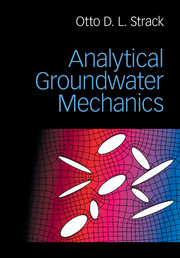Book contents
- Frontmatter
- Contents
- Preface
- Acknowledgments
- 1 Basic Equations
- 2 Steady Flow in a Single Aquifer
- 3 Steady Interface Flow
- 4 Two-Dimensional Flow in the Vertical Plane
- 5 Steady Flow in Leaky Aquifer Systems
- 6 Three-Dimensional Flow
- 7 Transient Flow
- 8 Complex Variable Methods
- 9 Fluid Particle Paths and Solute Transport
- 10 Finite Differences and Finite Elements
- Appendix A Sinusoidal Tidal Fluctuation
- Appendix B Numerical Integration of the Cauchy Integral
- List of Problems with Page Numbers
- References
- Index
8 - Complex Variable Methods
Published online by Cambridge University Press: 30 August 2017
- Frontmatter
- Contents
- Preface
- Acknowledgments
- 1 Basic Equations
- 2 Steady Flow in a Single Aquifer
- 3 Steady Interface Flow
- 4 Two-Dimensional Flow in the Vertical Plane
- 5 Steady Flow in Leaky Aquifer Systems
- 6 Three-Dimensional Flow
- 7 Transient Flow
- 8 Complex Variable Methods
- 9 Fluid Particle Paths and Solute Transport
- 10 Finite Differences and Finite Elements
- Appendix A Sinusoidal Tidal Fluctuation
- Appendix B Numerical Integration of the Cauchy Integral
- List of Problems with Page Numbers
- References
- Index
Summary
Introduction
As stated in the introduction of this text, analytic solutions to practical problems, often simplified, serve to help us understand the parameters and boundary values that determine flow characteristics. Analytic solutions may be an end in themselves, but they may also be used with great advantage prior to creating a numerical model; a good understanding of the characteristics of the problem likely results in an efficient and useful computer model.
Complex variable methods have been applied extensively in the past in the area of groundwater flow. The use of complex variables has decreased over time, partly because of the popularity of powerful computer programs for groundwater flow modeling, but also because of the common misconception that complex variables are difficult to understand and that their application is limited to Laplace's equation. The word complex in complex variables refers to the complex nature of the complex variable: rather than representing a single independent variable, it represents two. In practice, this leads to a reduction of the number of independent variables, from x and y, to a single one, z, thus greatly simplifying the mathematical operations needed to solve problems.
Complex variables are fully supported in many computer languages, in applications in hand-held devices, in spreadsheets, and in pocket calculators. As a result, solutions formulated in terms of complex variables can be readily implemented in computer applications, without the need to separate them into real and imaginary parts.
The complex variables as introduced in this chapter are presented in terms of complex coordinates: the complex coordinate z and its complex conjugate. As a result, the reader will note that the application to Laplace's equation is a special case of complex variable applications; complex variables are useful in describing general two-dimensional problems. This view of complex variables is due to Wirtinger [1927] and is known as Wirtinger calculus.
The primary advantage of transforming the Cartesian (x, y)-coordinate system into the non-Cartesian -coordinate system, where, z= x+ iy, (i2 = -1)is that it reduces the number of independent variables, xand y, to a single one, z. Since is known once is given, the second coordinate does not constitute a second variable.
- Type
- Chapter
- Information
- Analytical Groundwater Mechanics , pp. 218 - 356Publisher: Cambridge University PressPrint publication year: 2017



